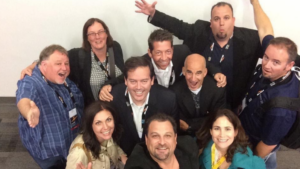Have you noticed it? There is a new system taking over—a paradigm shift, where access is valued over ownership, experiencing trumps possessing and what’s mine becomes “ours,” all in an attempt to maximize resources. People want to try things, but they don’t want to own them.
It’s peer-to-peer, popularly called “collaborative consumption.” Definitely check out Rachel Botsman & Roo Rogers’s book called “What’s Mine is Yours” and Rachel Botsman who did presentation at TED called ‘The Case for Collaborative Consumption.”
Sharing is not just something we teach on the playground anymore—it’s infiltrating both the workplace and the marketplace, and it’s happening all around us. In fact, in 2010, collaborative consumption was named one of TIME Magazine’s 10 ideas that will change the world.

It’s human nature to hoard and hold on to information, forcing most of us to play a constant tug-of-war with what we feel we “own” and don’t want to part with. To that point I say, part with it. The tools and approach we use at PureMatter allow us to pull information together as a team and curate content within industries or by interest. There’s a reason that Pinterest has grown to become the third largest social player in such a short time. It’s because it allows us to curate and share our interests together. It’s the ultimate collaborative consumption tool.
Here are three top ways that collaborative consumption is impacting our lives:
Product or service sharing. This is all about paying for the benefit of using a product or service without having to actually own it. Think car-sharing services, like Zipcar or Autoshare, or fashion rental companies like Bag, Borrow & Steal or Renttherunway.com. These types of companies allow you to rent everything from ball gowns to designer bags, luxury cars to children’s toys, without the commitment of ownership. You can use what you need, when you need it, then give it back.
Redistribution. Craigslist, eBay and Freecycle are the big players in this space where the idea is to pass (or sell) something that you don’t want any longer to someone who does. This supports the whole “one man’s trash is another man’s treasure” sentiment, and it’s both making and saving money for a lot of people.
Collaborative lifestyles. Couch surfing, anyone? This is all about individuals or communities who want to share in “the experience” and exchange time, space, skills or money. People are renting or loaning out their own homes and cars to travelers who want to skip hotel and rental company costs. Also, social collaboration is important right now as people try to pull information together and build methodologies or approaches toward this new experience we are calling “social media.”
Key takeaway: Let go, collaborate and share. What goes around, will come back around….making us more creative, innovative and less wasteful.





